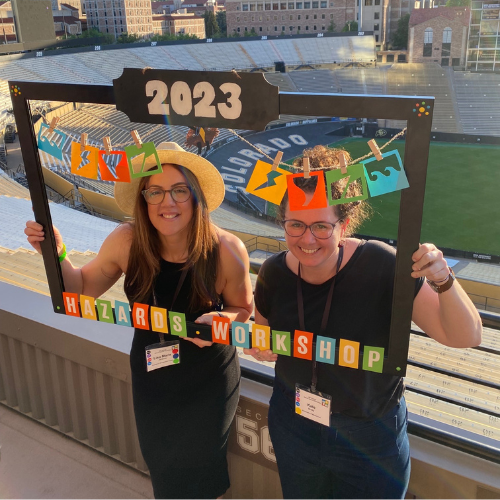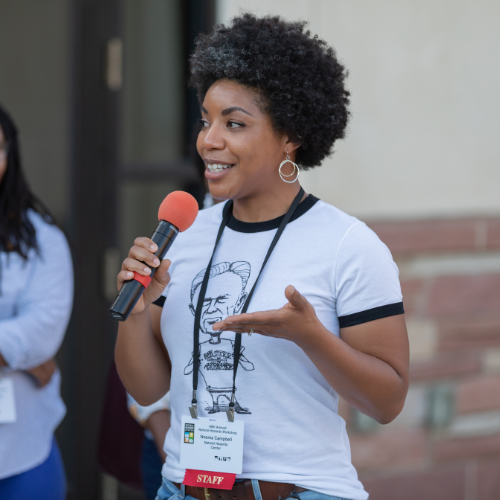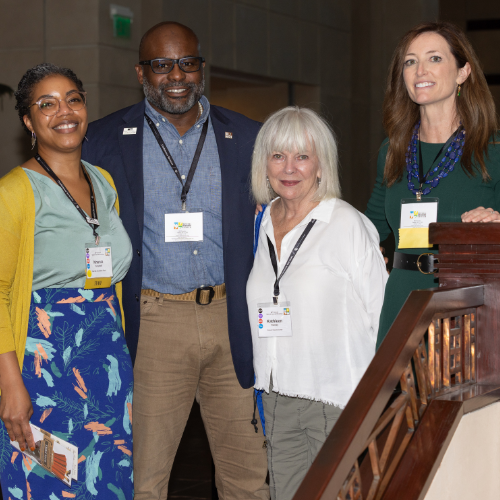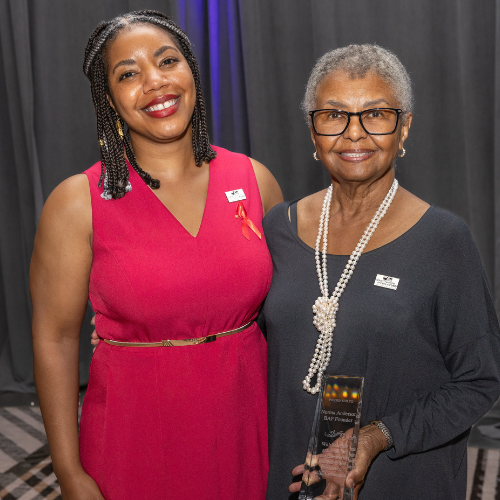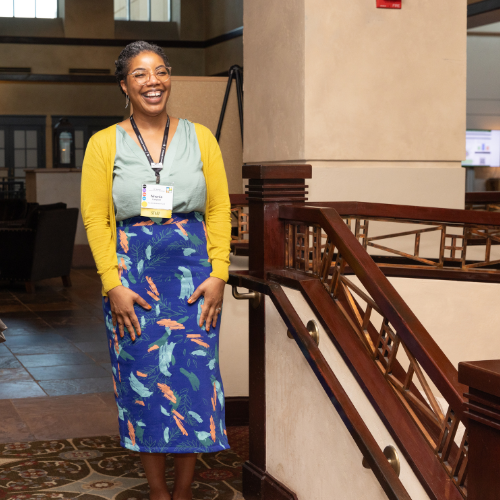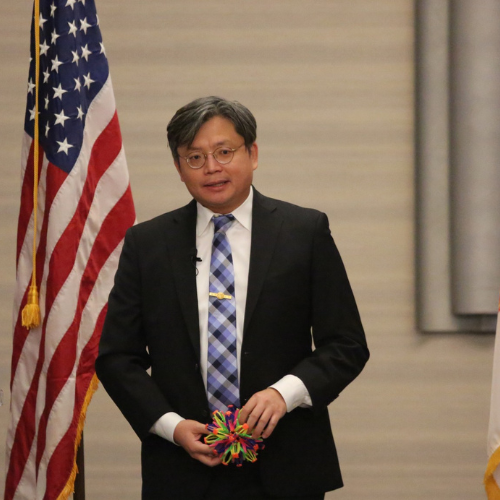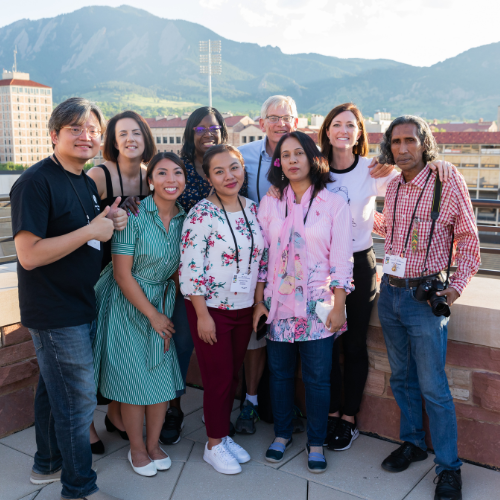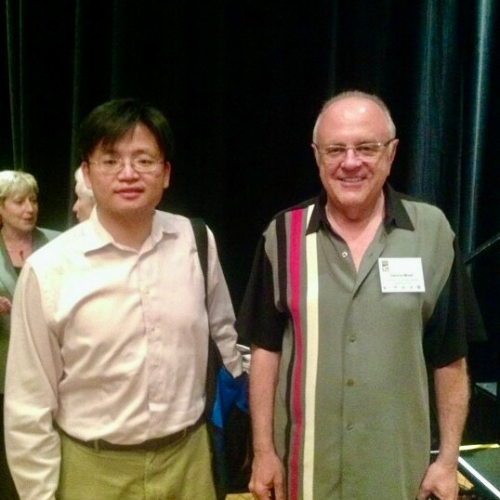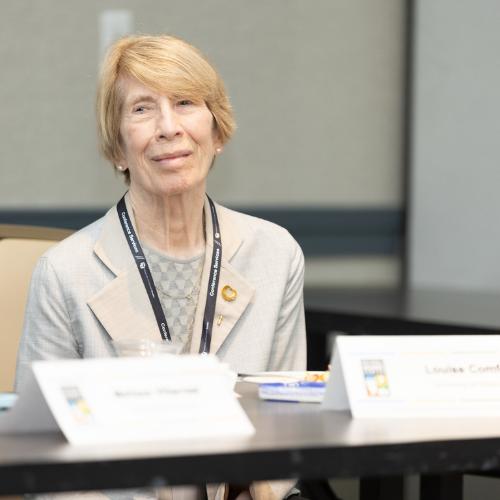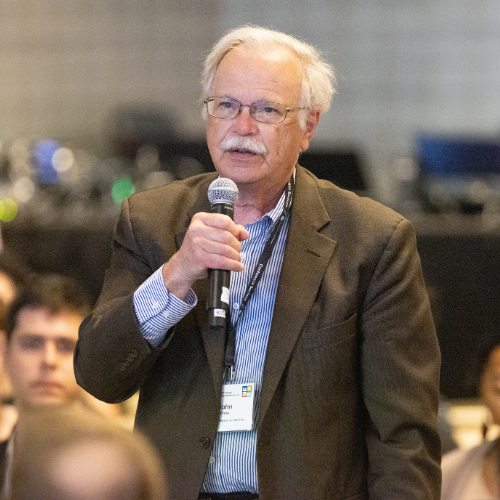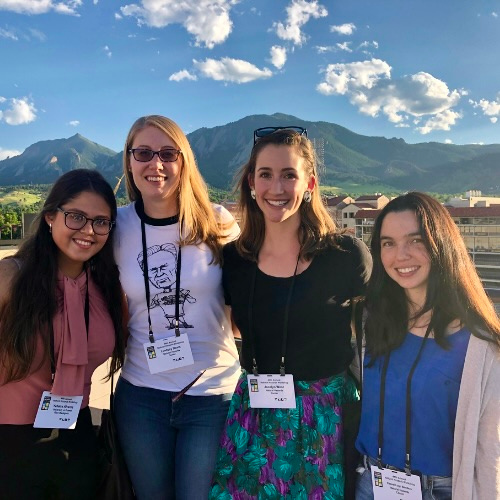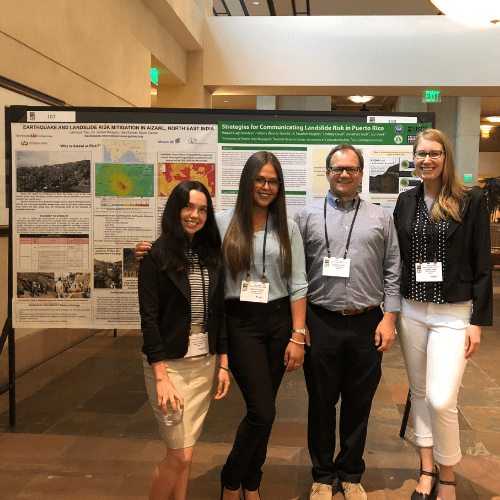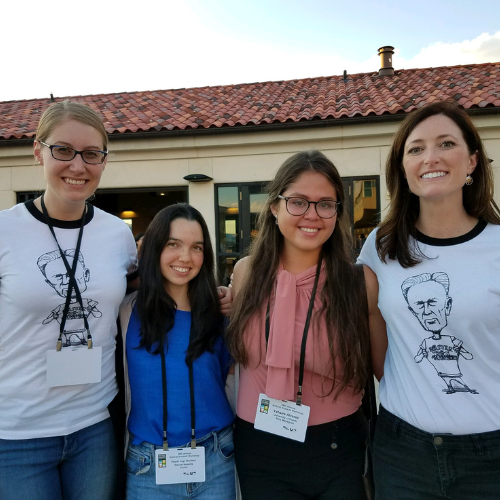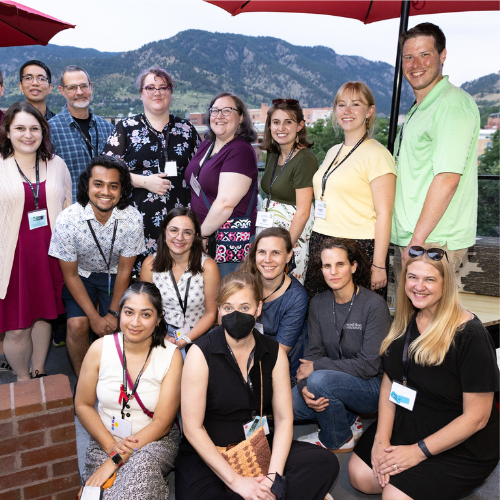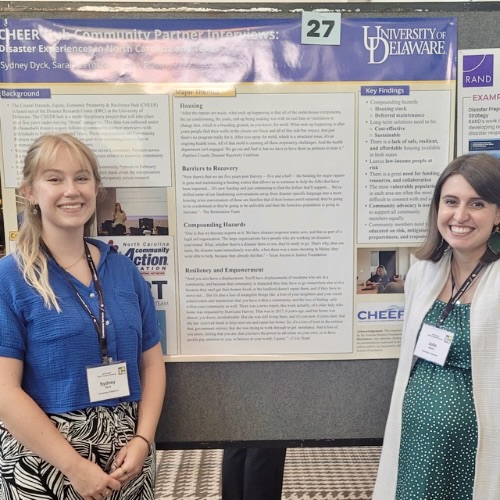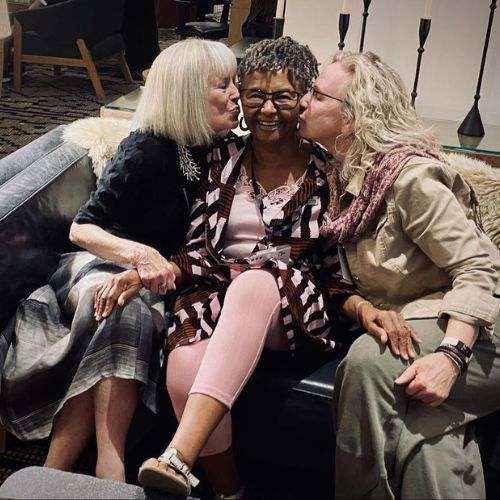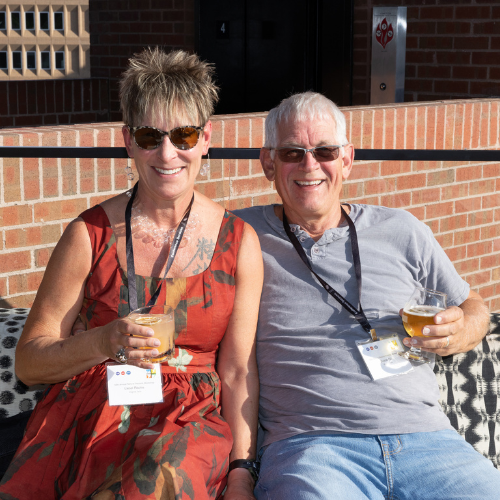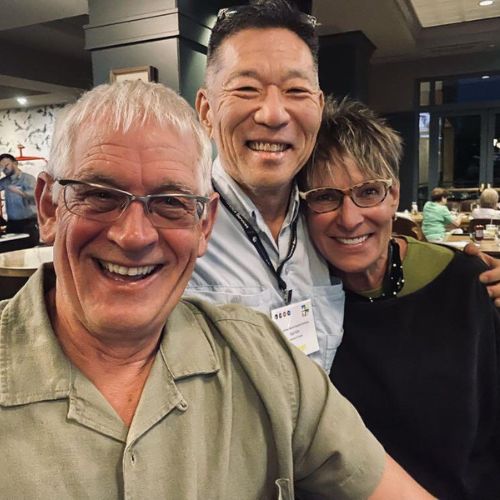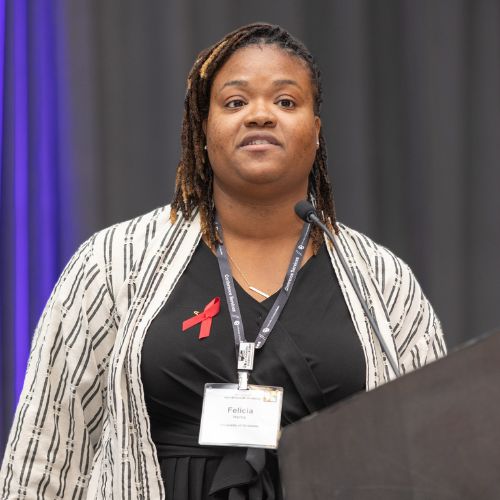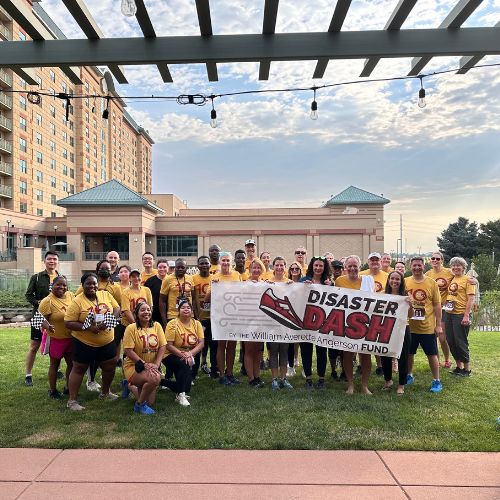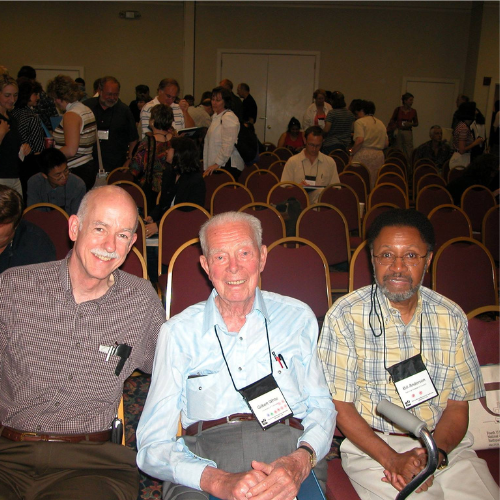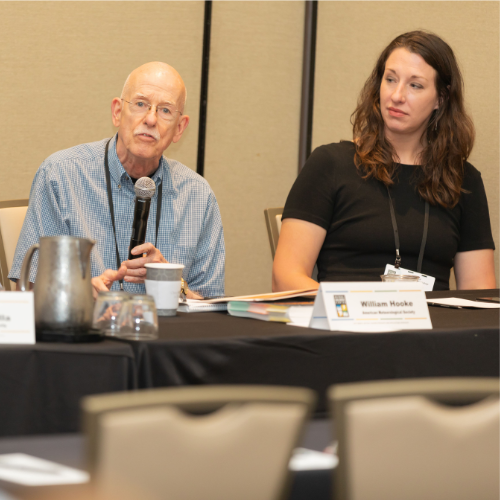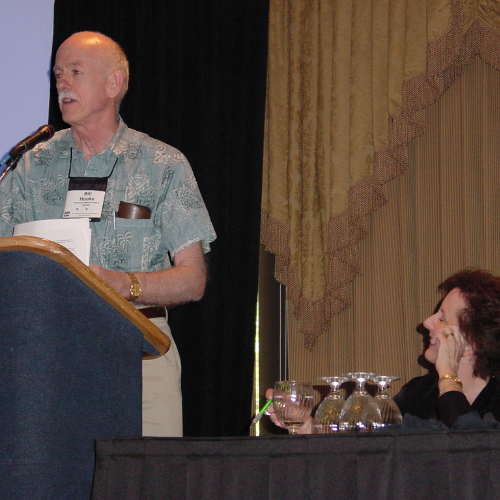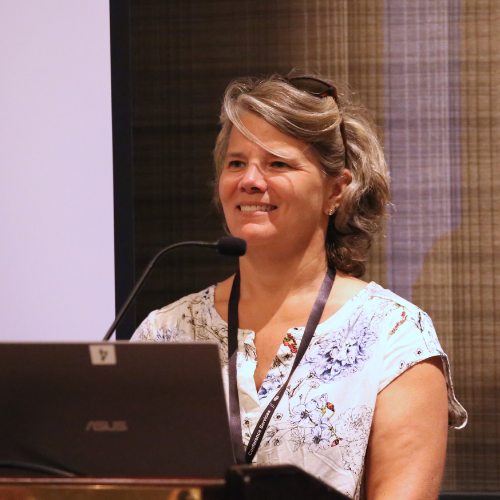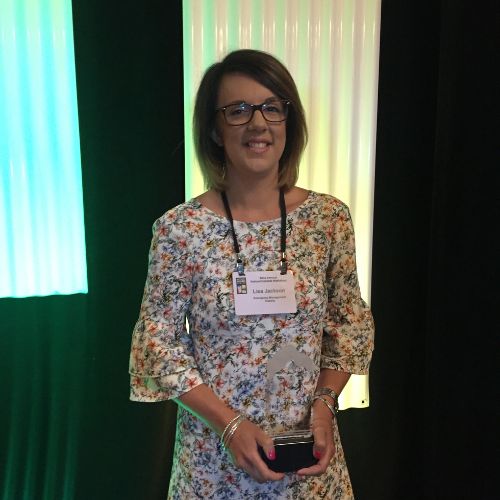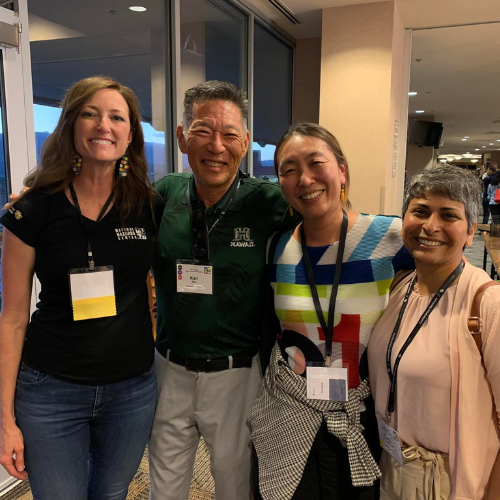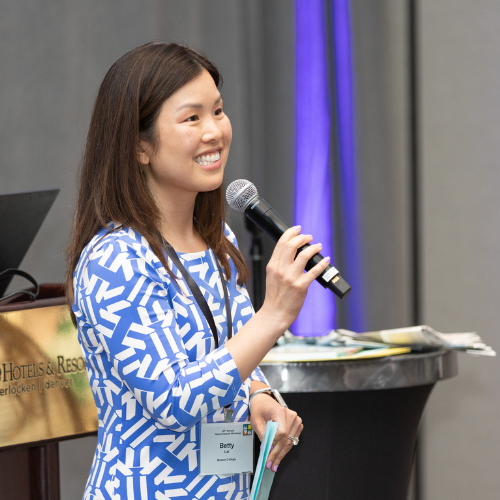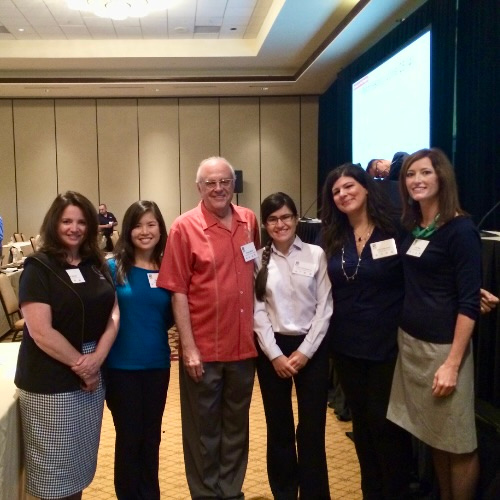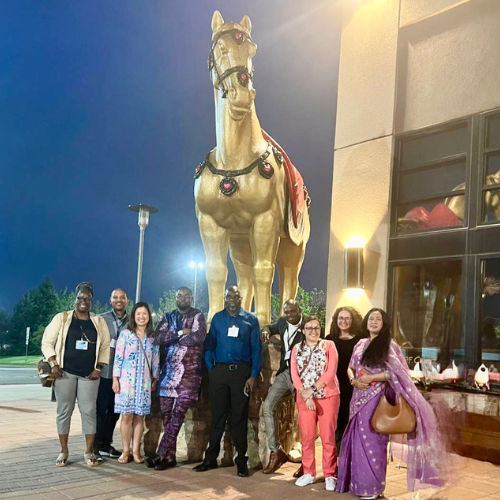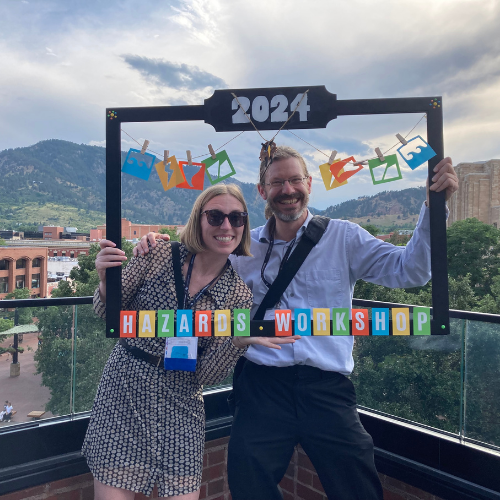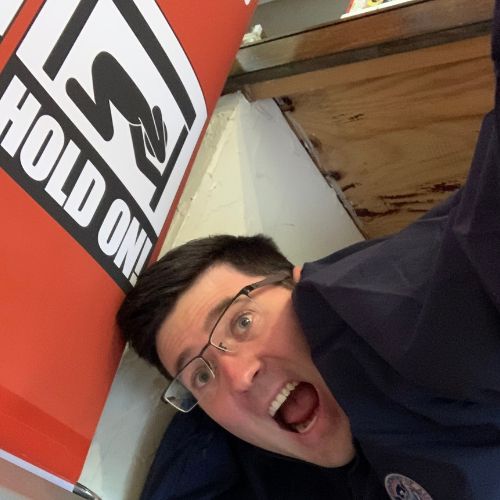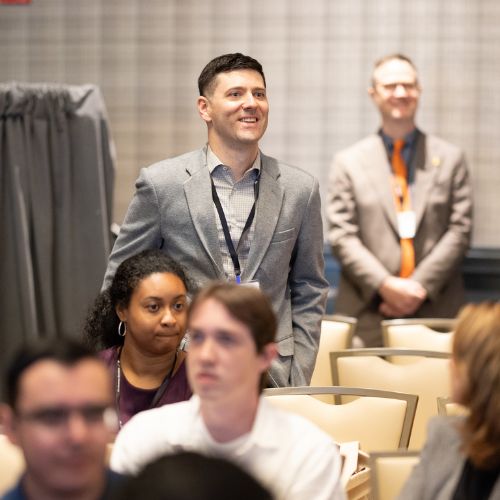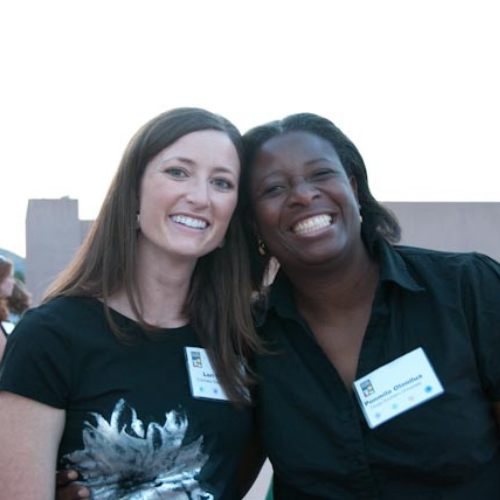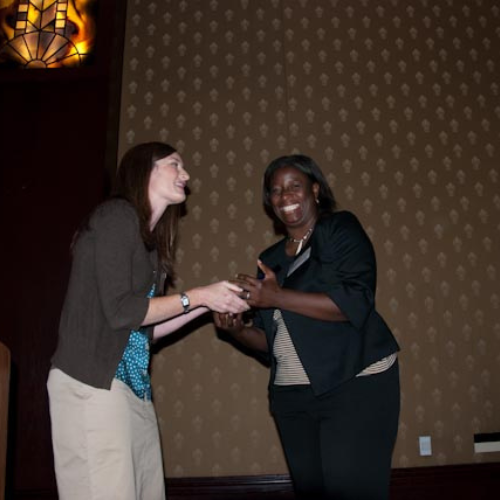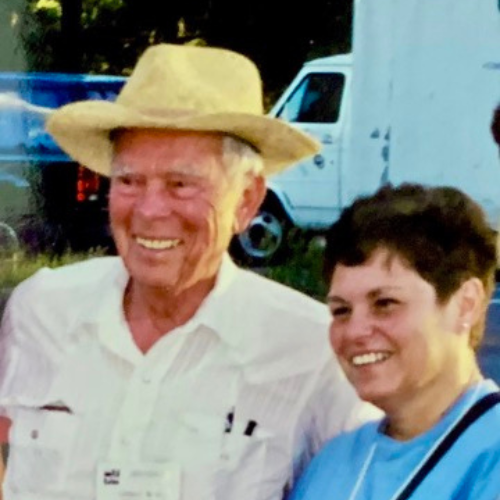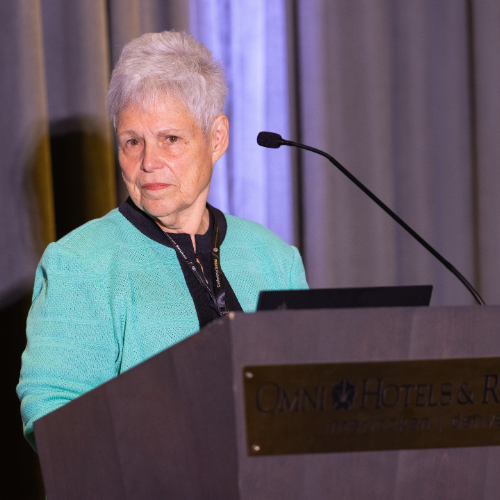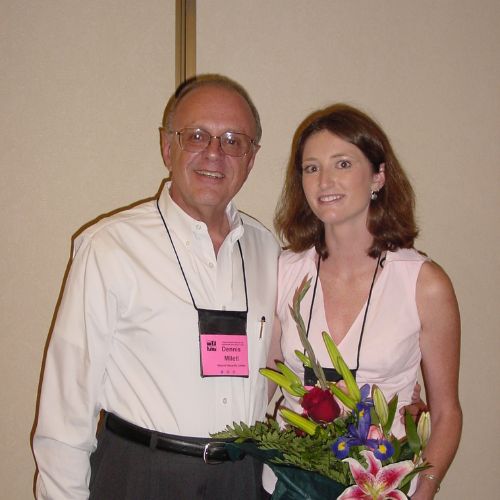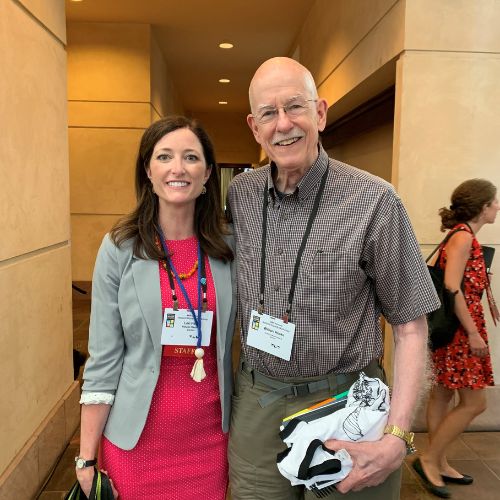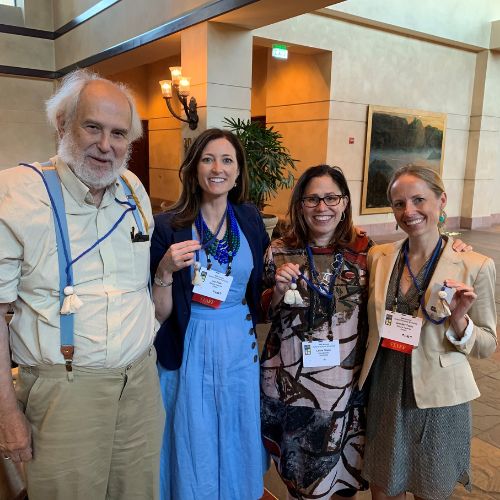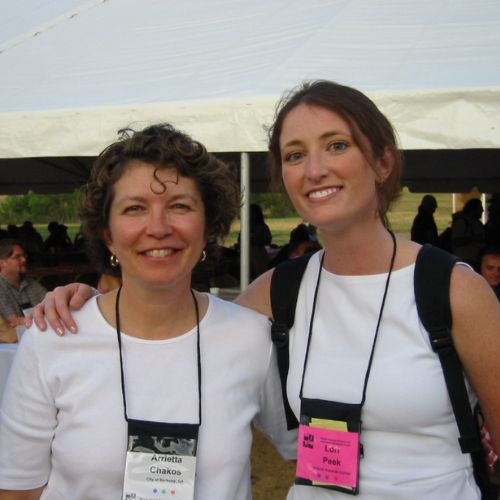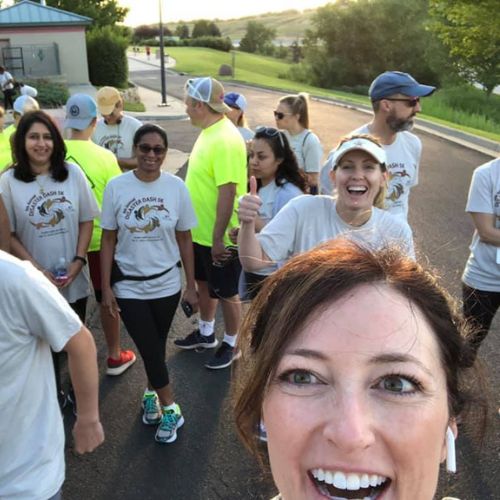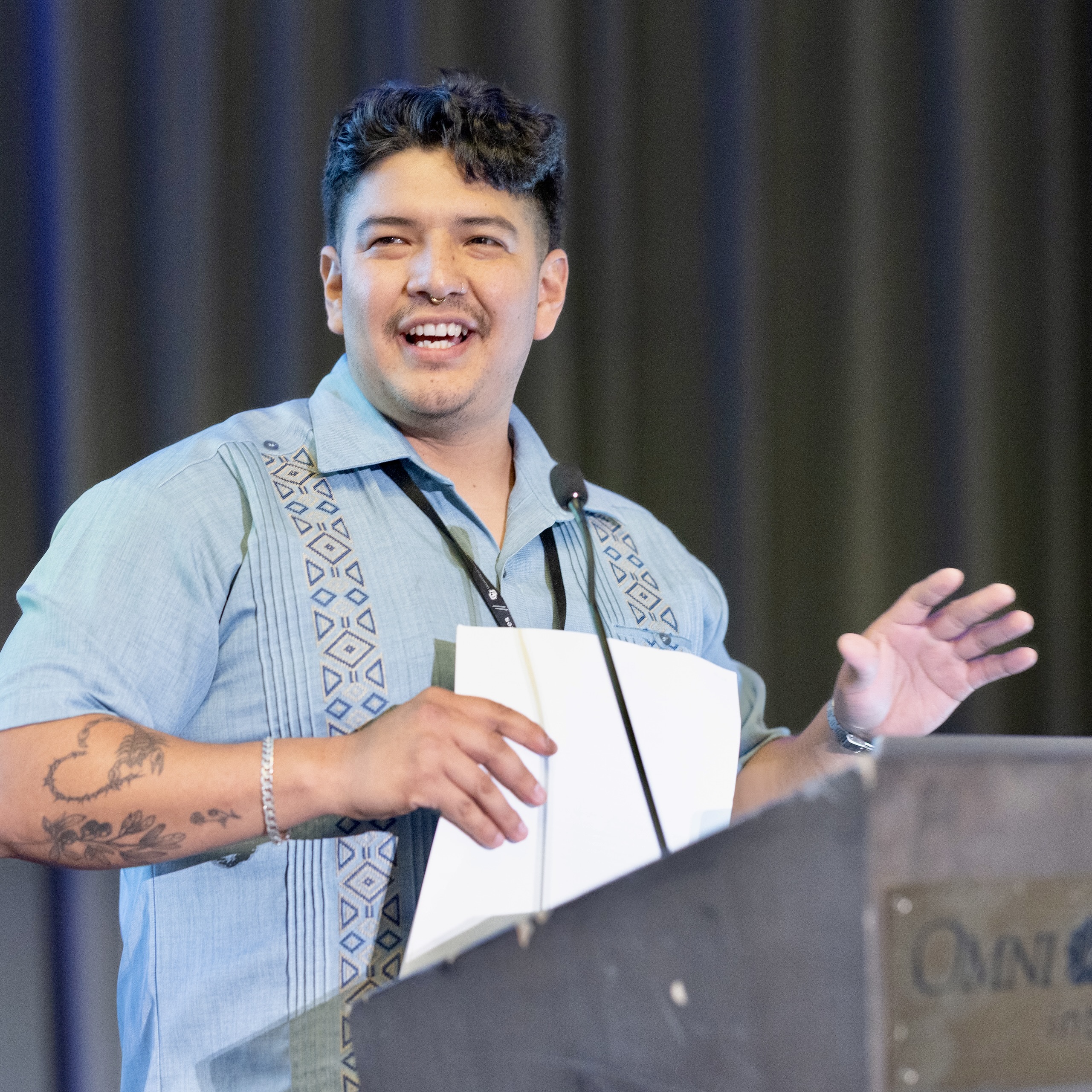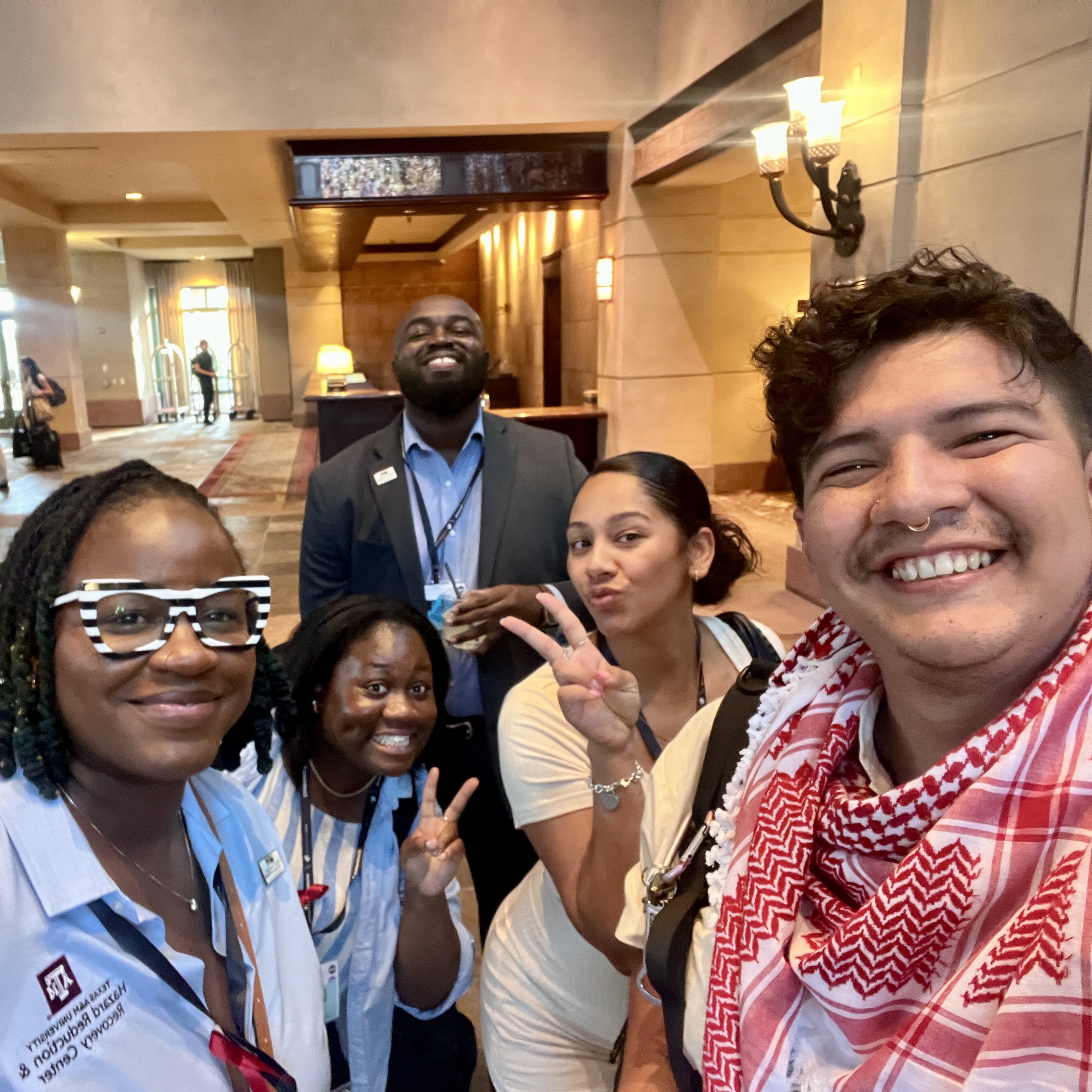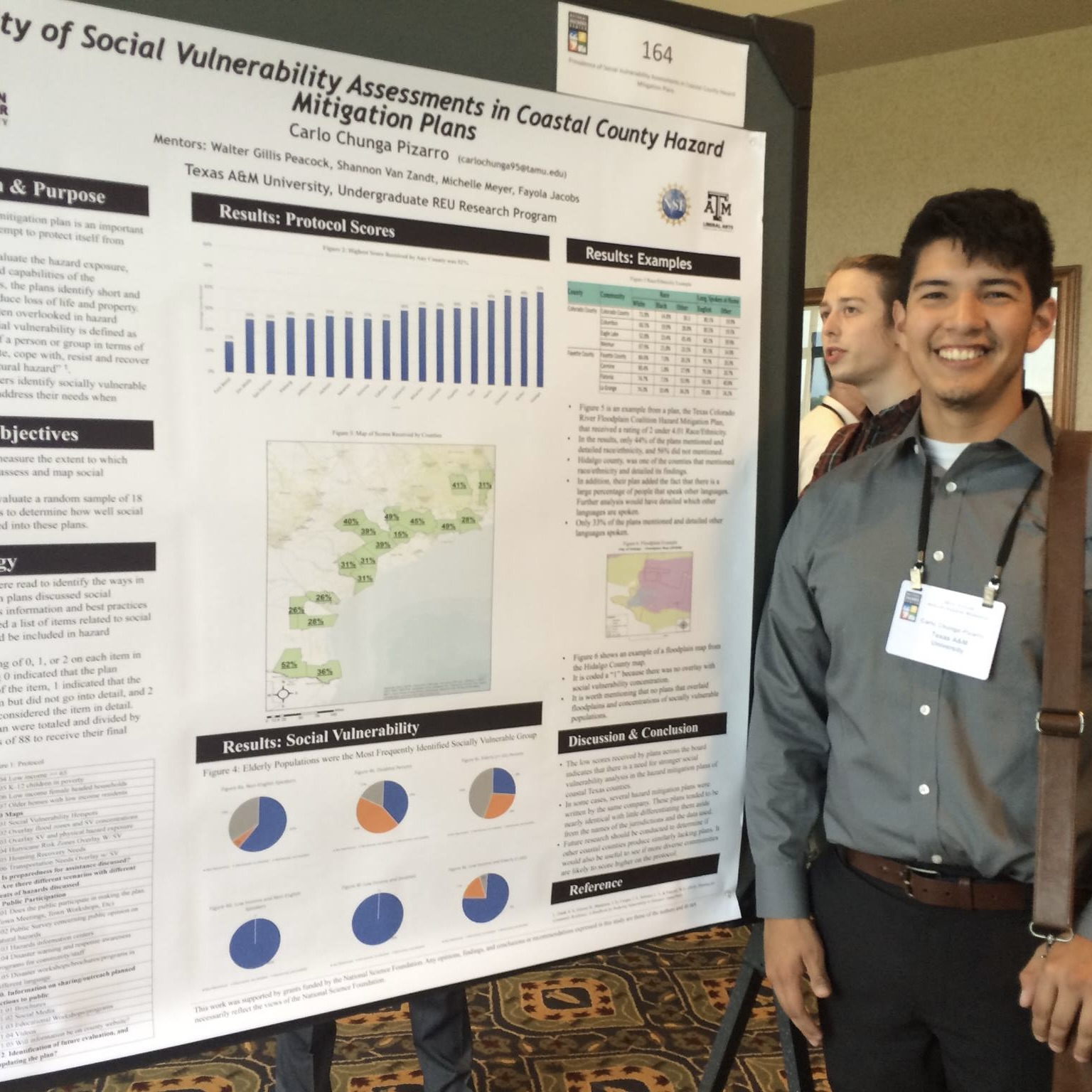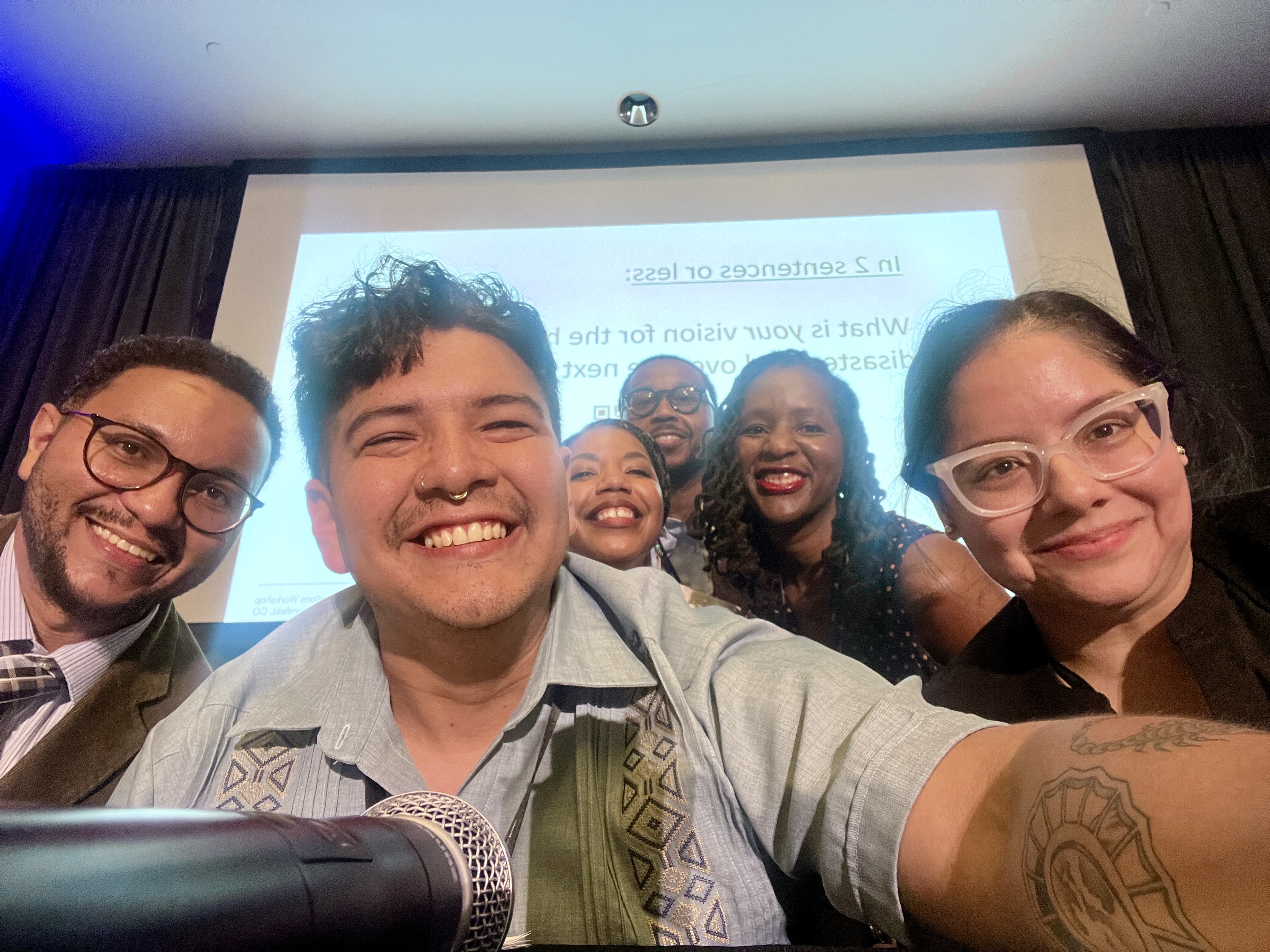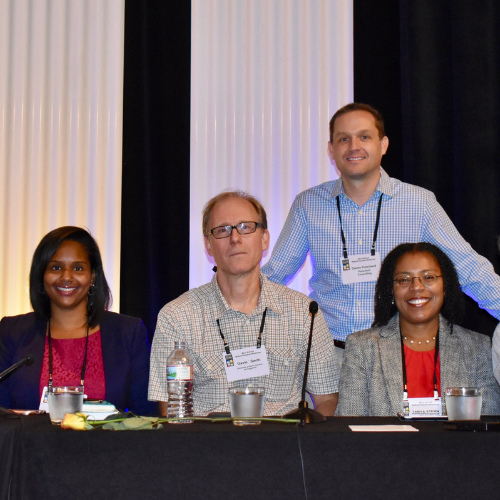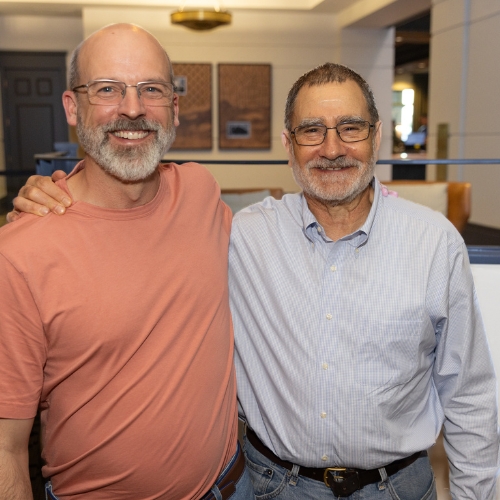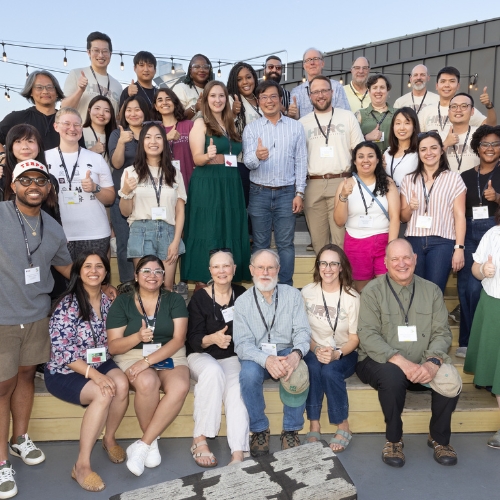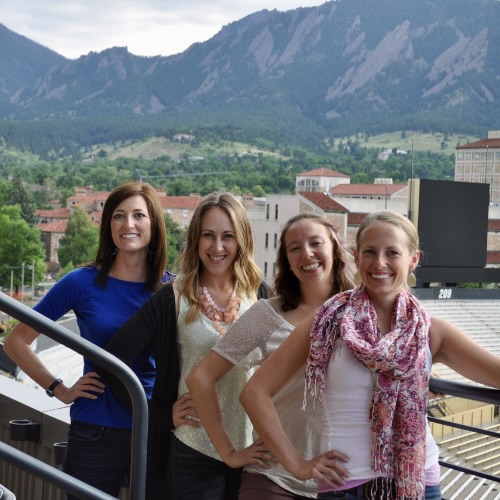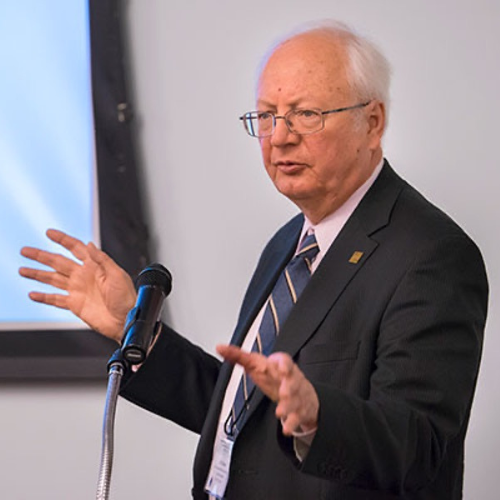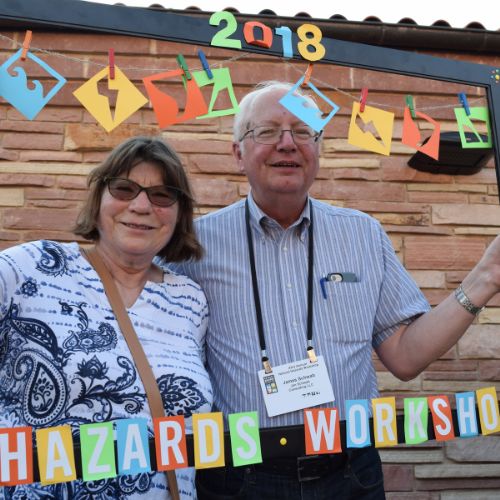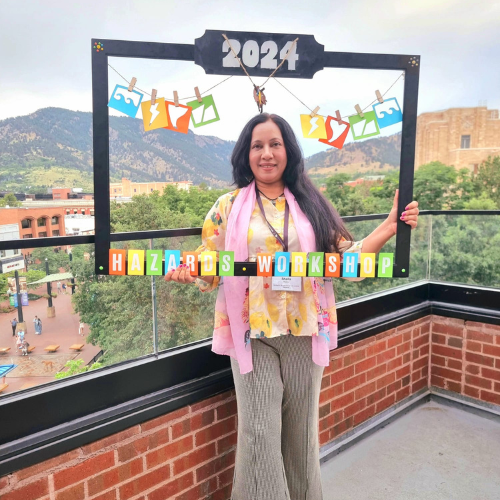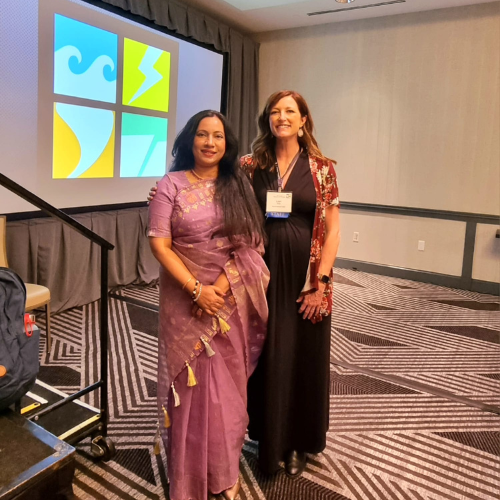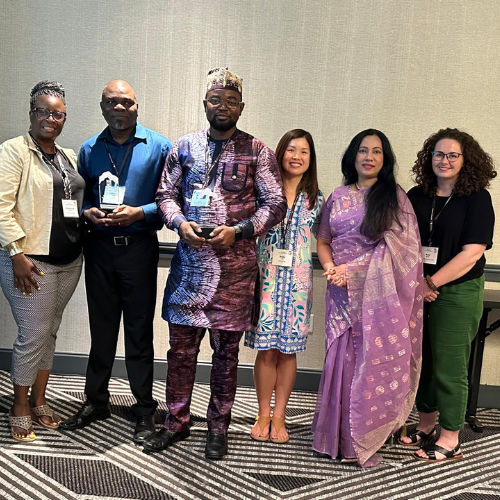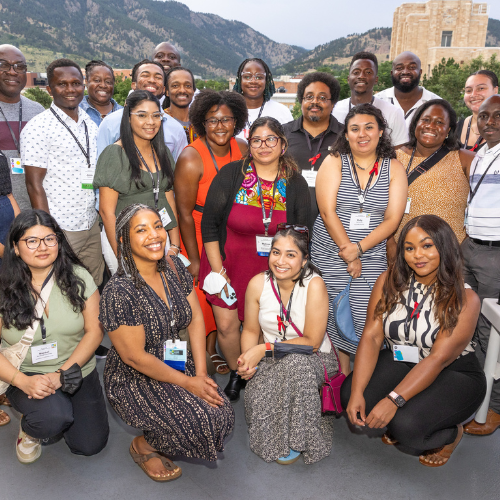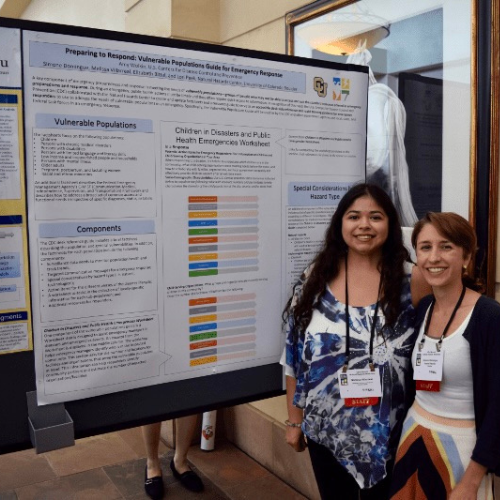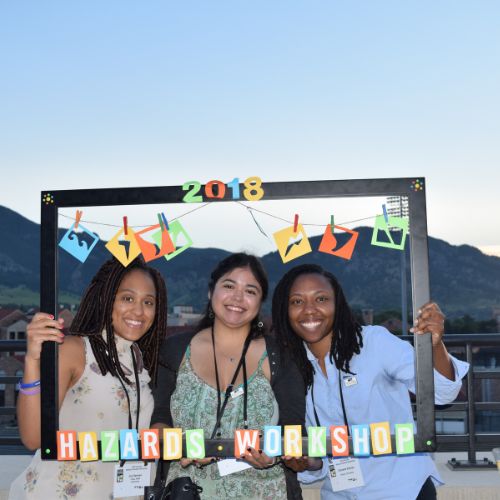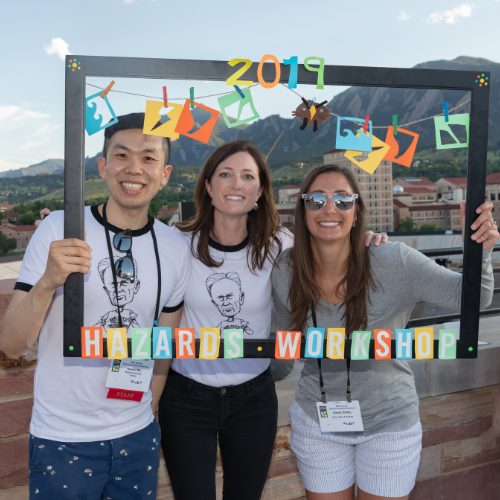Workshop Impact
In the summer of 1975, the Natural Hazards Center’s founding director Gilbert F. White gathered a small group of researchers and practitioners in Boulder, Colorado. The goal was to create a space where professionals could exchange knowledge and work towards a shared goal of reducing the harm caused by disasters.
Today, the Natural Hazards Workshop’s purpose remains much the same. We aim to share insights, inspire innovative work, and recognize our interdependence.
To celebrate our 50th anniversary, people from across the hazards and disaster community have shared stories of the Workshop's impact, compiled below.
Share Your Story
Click here to tell us what the Workshop means to you!
Kate Brady, University of New South Wales
Mary Fran Myers Scholarship recipient. Workshop attendee since 2015.
The first year I was able to attend the Workshop was 2015. I attended as a Mary Fran Myers scholarship recipient from Australia. I was a bit nervous about whether I would fit in, but I really didn't need to worry. For most of my career, I've had a foot in both the practice and research camps. While theoretically, that should mean that I feel at home at both practice and research forums, in reality it can mean not feeling like a good fit at either. The beauty of the Natural Hazards Workshop to me is bringing a lot of people together, irrespective of their role or organisation. Because we're all trying to work on the same issues and we have a wide range of perspectives to offer. It makes much more sense to me for people working from research, policy, and practice to come together than to have this work siloed.
I have since made it back to the Workshop another two times, and have made a lot of connections at the Workshop that have led to work collaborations, information exchanges and friendships. For example, in 2023 and 2024, the excellent Sara McBride was kind enough to host me while I was in the US for the workshop. In 2024, the lovely Jenna Tilt from Oregon State University came to visit us in Melbourne. And this year, we're lucky to be hosting wonderful fellow Mary Fran Myers alum Betty Lai from Boston College for her year long sabbatical in Sydney.
Being able to be a part of the Natural Hazards Workshop has made me feel like I have a connection to the work that is happening in the US and other countries, and that I am part of a bigger network that I can both call on and offer support to.
Nnenia Campbell, Bill Anderson Fund and Natural Hazards Center
Workshop Attendee since 2006.
I first attended the Natural Hazards Workshop as an undergraduate student participating in a Research Experience for Undergraduates program hosted by the University of Delaware. That one meeting changed my entire career trajectory. It was there that I met Kathleen Tierney and decided that I would get a PhD under her mentorship at CU Boulder. In that one experience, I had my entire career trajectory laid out for me. The Workshop enabled me to speak to people whom I only knew as foundational names on paper, and to be welcomed as a valuable member of the hazards and disaster professional community. I will never forget how that first Workshop made me feel that I belonged in disaster research.
Ray Chang, Embry-Riddle Aeronautical University
Mary Fran Myers Scholarship recipient. Workshop attendee since 2012.
The Natural Hazards Workshop has been a foundational part of my academic and professional journey. In 2012, I received the Mary Fran Myers Scholarship shortly after leaving the fire department and during my second year as a PhD student. At that time, I was still navigating how to bridge my practice-based experience with emerging research goals. The scholarship reaffirmed that my efforts to integrate academic and practitioner perspectives were both needed and valued.
Since then, the Workshop has consistently offered space for meaningful engagement and exchange. Over the years, I’ve presented multiple research posters, contributed to sessions, and served on the Mary Fran Myers Scholarship selection committee. I’ve also co-organized and moderated researcher-practitioner panels and presented with the Federal Emergency Management Agency's higher education program manager to highlight collaboration models across sectors.
A professional connection made at the Workshop also led to a co-authored publication exploring disaster preparedness and response in Hawaii—one of several scholarly outputs shaped through Workshop engagement.
For me, the Workshop has never been just a conference; it has been a collaborative space that fosters trust, connection, and shared learning across roles and disciplines. I’m grateful for the opportunities it has provided and proud to be part of a community that continues to move the field of hazards and disaster research forward in thoughtful and inclusive ways.
Louise Comfort, University of California, Berkeley
Workshop attendee since 1985.
In 1985, I received a Quick Response grant from the Natural Hazards Center to study communication and coordination among international disaster assistance teams that responded to the Mexico City Earthquake, on September 19, 1985. The following summer, I attended the 1986 Natural Hazards Workshop, and engaged in a conversation with Henry Quarantelli. I was excited to share with Henry my observations of the earthquake response operations, and eagerly showed him photos I had taken—damaged buildings, collapsed general hospital, fallen electrical lines sagging across city streets. Henry looked at the photos thoughtfully, and then asked: "Louise, where are the people?" Startled, I realized that Henry was absolutely right; I had focused on the visible destruction of buildings and infrastructure, and not the social destruction of families and neighborhoods. That conversation changed fundamentally my approach to reconnaissance research; after 23 reconnaissance studies, all photos have included people.
John Cross, University of Wisconsin Oshkosh
Workshop attendee since 1983.
I have attended many of the Workshops over the past forty years, and I always left the gathering energized and better informed. I was often amazed by the insights that both academics and practitioners shared during the gathering. The scheduled sessions were the formal highlight of the meeting; however the informal discussions during lunch, the BBQs, and breaks were often the best way to share findings, learn new approaches, and make friends. The earlier BBQs at Gilbert White’s mountain-top ranch, reached by struggling buses, were particularly memorable, even the one where we all had to flee a thunderstorm.
During many of the Workshops those of us who were geographers and active members of the American Association of Geographers Hazards Specialty group would informally discuss our plans for the following year’s annual meeting. In more recent years, the Researcher’s Meeting that followed the Workshop provided an opportunity to share findings that had been or would shortly be discussed at the geographers’ meeting, disseminating knowledge between the various disciplines.
The opening and closing sessions of the Workshop presided over by Gilbert White in the first years, and later by Bill Riebsame Travis, Dennis Mileti, and Kathleen Tierney before Lori Peek, were always memorable. I remember one closing session in which Gilbert White surprisingly, mentioned me by name, something that further encouraged me to engage in scholarly activities worthy of his recognition.
Lindsay Davis, U.S. Geological Survey
Workshop attendee since 2014.
I first heard about the Natural Hazards Workshop when I was 22. I couldn’t join my undergraduate internship mentor, Michele Wood (Cal State Fullerton), at the Workshop that year, but three years later I had the chance to attend as a volunteer while home from a Peace Corps assignment in El Salvador. A charismatic Colorado State University professor named Lori Peek approached me at one point to discuss a question I asked during a session. After that five-minute conversation I knew I wanted to work with Dr. Peek at some point.
A fateful encounter with Dr. Jonathan Godt of the U.S. Geological Survey (USGS) at a congressional briefing during a policy fellowship in D.C. gave me that chance a few years later. Jonathan and Lori invited me to work on a Puerto Rico landslide project, and I joined the Natural Hazards Center team as a research associate soon after, working with colleagues from the USGS, the University of Puerto Rico, and the University of Colorado Boulder. The Workshops allowed the team, including our two fabulous undergraduate students from Puerto Rico, to come together and share our work. Networking with budding professionals and seasoned experts, reconnecting each year with colleagues and friends, participating in and contributing to sessions, attending the BBQ…the Workshop continues to be a cornerstone of my career journey. Now, a USGS scientist focusing on international humanitarian assistance, this community remains a web of disciplines, cultures, and mentors that I draw on for collective learning, cross-pollination, and inspiration.
Sydney Madison Dyck, University of Delaware
Student Paper Competition Winner. Workshop attendee since 2020.
I was the winner of the 2020 Undergraduate Student Paper Competition for the Natural Hazards, and since that time my life has changed dramatically through this opportunity! When I submitted my paper, I was finishing my undergraduate degree, and had applied with the encouragement of my mentor, Dr. Tim Haney at Mount Royal University. I had only ever taken his disaster sociology class, and my knowledge of the disaster world was only informed by this, but I was hooked!
Winning the student paper competition and attending the Workshop online in 2020 exposed me to so much more of the field. Ultimately, the experience drove me to apply for graduate school in the U.S., leaving Canada to attend the University of Delaware and become an affiliate at the Disaster Research Center. Since then, I have published papers on disasters and embarked on three fieldwork trips, including to Western North Carolina following Hurricane Helene this past fall. Winning the Student Paper Competition gave me the boost of confidence I needed to really dive into the disaster world, and the kindness from everyone at the Natural Hazards Center made that even more viable for me. I am proud to say that I am part of the disaster research community now, and attending the Annual Hazards Workshop is one of the best ways to experience the passion of the field. Thank you again, NHC, and congrats on 50 years!
Suzanne Frew, The Frew Group
Workshop attendee since 1995.
Where does one begin?! The Workshop has served as a special thread for being able to “come home” throughout my years in emergency management. Both professionally and personally, the Workshop, first in Boulder, then a very quick moment in Denver, and now in Broomfield, has served as a remarkable touchstone in my life’s journey. My eyes were opened to new ideas, perspectives, and teaming partners. And of course, the joy of coming to the mountains can’t be beat! The Workshop was there for all of us when things got very dark after 9/11 and when we celebrated progress with exciting new funded initiatives (anyone remember Project Impact?). In “Boulder” we come together as a community. With old and new friends, together we’ve faced budget cuts, job changes, and shifting social landscapes, welcomed new children, and wept with the passing of special friends and colleagues. It’s served as a milestone as I’ve transitioned through own life and career. So thankful for the inspiration, resources, & joy.
Duane Gill, Virginia Tech
Workshop attendee since 1989.
My first workshop was in 1989. Our research team had been awarded a Quick Response grant to study community impacts of the Exxon Valdez oil spill and we were attending the Workshop to make connections with other social scientists, practitioners, and those from government agencies. This initial support provided a foundation for 24 years of research on the sociocultural and psychosocial impacts of the spill on the community of Cordova, Alaska. The Hazards Workshop has continued to be a source of inspiration and support!
Felicia Henry-Conteh, American University
Bill Anderson Fund Fellowship recipient. Student Paper Competition Winner. Workshop attendee since 2020.
I first attended the Natural Hazards Workshop in 2020. It was virtual, as we were amid the COVID-19 pandemic. As someone new to the hazard and disaster mitigation field, the Workshop was fascinating in its diversification of perspectives and disciplines. There were so many sessions I saved to my schedule, even though I knew I couldn’t attend them all. I wrote down the names of scholars and practitioners so that I could follow their work and meet with them after the Workshop. It also gave me hope, as a scholar whose research existed in an understudied intersection of disasters and criminal justice. Participants who studied social vulnerability and community resilience were encouraging to listen to, learn from, and even respectfully critique. At the time, I was also a Bill Anderson Fund Fellow, so it was great to witness my colleagues engage in conversations about their scholarship along with heavy hitters in the field. Years later, the NHW remains a space of collaboration, of inquiry, of critique, and of inspiration. Folks who may have never crossed paths before get to network in real-time and participate in discussions that spark future research questions. I’ve received tangible benefits from being connected to the Natural Hazards Workshop, like winning the Graduate Student Paper Award, finding research opportunities and research collectives focused on incarceration and disasters, and publication opportunities like participating in the Research Counts series. But I’ve also received intangible benefits, primarily being connected to scholars who have become not just colleagues, but friends. I’m grateful for the community it creates and sustains.
Bill Hooke, American Meteorological Society
Workshop attendee since 1987.
As an atmospheric scientist, I am only a grafted branch in the hazards community. In the 70s' I had been working for the National Oceanic and Atmospheric Adminstration in Boulder and aware of the Natural Hazards Research and Applications Workshops' launch, but my first Workshop might not have been until 1987 or 1988. I was there by happy accident, but the Workshop immediately became my favorite meeting of each year. I attended most of the Workshops following until COVID-19.
For me, the Workshop represents years of remedial education. The meetings drive home multiple basic ideas: Extremes are nature’s way of doing business; by contrast disasters are a human construct. Disasters might result directly from poor land use, building codes, fragile infrastructure, etc. But the root causes are poverty, social injustice, gender inequities, repeated failures to learn from experience—human culture, values, and shortcomings.
Each Workshop is magical. The goal of reducing disasters’ harm. The Colorado setting. The format. The mix of researchers and practitioners. A place-based emphasis but international reach. The invitational nature cohabiting with one-third participation by first-timers. And more recently, rigorous, meticulous crafting of major themes and minutest details by Lori Peek and the incredible Natural Hazards Center staff.
The first twenty years of my career had always brought joy. The Workshop experience deepened that. Ever since, work every day has been “a new chance to do eight billion people some good.” That’s been inspired by the personal example of hundreds of Workshop attendees and their commitment, passion and vision. The Workshop has changed my life, made me a better person.
May the Workshop endure another fifty years.
Jennifer Horney, University of Delaware
Workshop attendee since 2004.
I presented on what would become my dissertation on hurricane evacuation in 2004, when the meeting was still at a hotel in Boulder. Hugh Gladwin, a hurricane evacuation scholar and now professor emeritus at Florida International University attended. Hugh took time to ask me a lot of questions and show interest in my research. I think it was my first time meeting a researcher I only knew from reading their research. I was hooked, and I think of that interaction and always try to pay it forward with graduate students and junior scholars.
Lisa Jackson, Victoria, Australia Department of Justice and Community Safety
Mary Fran Myers Scholarship recipient. Workshop attendee since 2017.
The Workshop has had a significant impact on my life, both personnally and professionally. I first attended the Workshop as a result of receiving the Mary Fran Myers Scholarship, which was an incredible honour. From this experience, I have returned to the Workshop twice more. Through attending the Workshop and being a part of the Mary Fran Myers Scholarship community I have significantly expanded my professional network and been exposed to programs and research that I would not have otherwise been exposed to. These connections have assisted me and my colleagues with access to good practice to inform the work we do before, during and after emergencies. Furthermore, I have personnally been incredibly lucky to build close relationships with colleagues I met through the workshop and the scholarship community whom I am grateful to call friends.
Alessandra Jerolleman, Loyola University New Orleans College of Law
Workshop attendee since 2006.
I first attended the Workshop in 2006, after French Wetmore talked me into applying for the Scholarship. At the time, I was finishing up my Master's degree at the University of New Orleans (UNO), and was debating whether I would continue on to pursue a PhD. The Workshop was instrumental in exposing me to the wide array of research, practice, and scholarship in the disaster space. I was also still reeling a bit from my personal experience with Hurricane Katrina and had only recently been exposed to participatory action research.
My personal journey as an applied researcher was not an easy one. Although I was briefly employed as a graduate assistant, it became clear after one semester of the doctoral program that the very limited funding that UNO could provide was not sufficient for my family, particularly after Hurricane Katrina. I had to do the bulk of my doctoral work (from 2007 until 2013) while working full time and raising my daughter. The Natural Hazards Workshop remained a space that I could go to, at least every other year, as both a professional doing disaster work in the private and non-profit sectors, and as a doctoral student pursuing a non-traditional journey.
Over the many years since then, the Workshop has been instrumental in many key moments in my career: from co-founding the Natural Hazard Mitigation Association to continuing to meet collaborators, mentors, and friends. I look forward to many more years of participating!
Karl Kim, University of Hawaii
Workshop attendee since the early 2000s.
The Natural Hazards Workshop gives me hope for the future and fosters collaborative, impactful commitments to learning from, mitigating, and adapting to hazards and threats we face. It is about the research and training and working collectively to build and sustain strong, vibrant, diverse, and just communities. We have so much more to do and the need for the Workshop has never been greater or more urgent. I'm so grateful for the opportunity to learn from, work with, and share ideas and practices and Aloha everyone I meet there. Let's stay connected and engaged to continue the important work of the Workshop!
Betty Lai, Boston College
Mary Fran Myers Scholarship recipient. Workshop attendee since 2014.
The Workshop changed the trajectory of my career. It opened my eyes to the world of hazards and disaster research and practice. At my first Workshop, I met Ann-Margaret Esnard, who became a close mentor and friend. We went on to co-write my first federal grant and co-teach a course. I met like-minded peers who let me know about opportunities and fellowships that helped me earn tenure.
Over the years, the Workshop has made a difference in my life because it's dedicated to deepening our connections to each other and to the grand challenges we are trying to address in our work. This focus means that colleagues I've met at the Workshop are now close friends. They are people I call with happy news or when I've run into a work problem. I get to celebrate the milestones in their life every July.
And I've been privileged to serve on the Mary Fran Myers Scholarship committee. The scholarship started in 2004 and has supported over 60 practitioners and researchers attending the Workshop. Our global network grows every year—as do the connections we've formed. To illustrate, I just submitted a seed grant led by Kate Brady, with a letter of support from Lisa Jackson—both are fellow scholarship alumni.
Carson MacPherson-Krutsky, Natural Hazards Center
Workshop attendee since 2015.
The Natural Hazards Workshop is where I found "my people!" I come from a geology background, but was always more interested in the human aspects of geohazards than more technical field pursuits. I felt out of place in geology departments and that I was constantly having to justify my work. I found the Natural Hazards Workshop organically while at a summer internship in Boulder in 2015. I secured a volunteer opportunity to attend and was pleasantly surprised at how many people cared about the same thing I did. Attending that first Workshop totally changed my career path and opened new possibilities for me. Now, ten years later, I am helping to plan the 50th Annual Natural Hazards Workshop. I feel oh so fortunate to be part of this community and am inspired each year I attend!
Sean McGowan, Independent
Workshop attendee since 2010.
As a structural engineer, my first Natural Hazards Workshop was quite the culture shock! I was used to hearing about and solving problems that have obvious and straightforward answers. The Workshop thankfully changed my perspective forever. The Workshop helped me better understand why natural hazard risk reduction is so tricky. It’s not just the engineering nuts and bolts, it involves policy innovations, sustainable funding access, relatable risk communication for the impacted communities, and (most importantly) an understanding of the systemic hurdles (both accidental and intentional) that perpetuate the inequities in risk exposure. The Workshop gave me the tools to connect the engineering I learned in school with the tugs on my heart I felt in the field. It changed how I work, relate with those I serve, better craft my risk communication, and how I see the gaps I can help address. I look forward to having my mind blown each summer at the Workshop!
Oluponmile “Ponmile” Olonilua, Texas Southern University
Mary Fran Myers Scholarship recipient. Workshop attendee since 2009.
I came into the Workshop with little experience interacting with practitioners in the field. We all had to introduce ourselves one by one the first morning. I heard names I have read their work and was immediately drawn in. I made connections that have remained till today. Because I was a Mary Fran Myers scholarship winner, my information was already on the website before I even met anyone. I remember getting a call from two practitioners who were interested in my review of hazard mitigation. They visited with me and I remain a reviewer of hazard mitigation plan for credit rating system (CRS) to this day. I’m happy to say that I introduced the Continuing Education Credits to the Workshop and they have remained. I have published with people I met at the Workshop. I have collaborated on grants and teaching with people I met there. I have been involved in bringing in researchers and practitioners to the Workshop through the same scholarship that brought me in the first place. I have served on the Mary Fran Myers committee as chair, co-chair, and now a member. I keep building on these relationships and hope to continue to leave my mark on the Workshop.
Rob Olshansky, University of Illinois at Urbana-Champaign
Workshop attendee since 1985.
My first decade of attending the Workshop is what shaped my career. Pre-internet, this was the way to meet everyone involved in hazard policy, research, and local practice. Everyone who mattered was there, in an informal setting. I could learn from all of them in the sessions on current policy issues and ongoing research, and I could meet all of them during the breaks, lunches, and barbecue. Regarding research, this was the place to identify research needs, find research collaborators, and meet with funding agencies. Two specific memories: In 1986, I stayed for three additional days for dissertation research, because the Natural Hazards Center library was the single best repository for governmental hazard reports and unpublished research. Think of all the PDF reports we now download every day; they could only be found in this one library. The other memory is that Gilbert White was a constant source of inspiration, and I am grateful to have known him.
Risa Palm, Georgia State University
Workshop attendee since 1977.
My first Hazards Workshop was in 1977, during a sabbatical from the University of California, Berkeley and just before I joined the geography faculty at the University of Colorado Boulder as an associate professor. Gilbert White encouraged me to explore the field of natural hazards, noting the connection to my interest in the geographical implications of real estate practices. He specifically pointed to California’s adoption of the Alquist-Priolo Special Studies Zones Act following the 1972 San Fernando earthquake, which required property sellers and their real estate agents to disclose seismic hazard zones. That conversation, along with the insights and encouragement I received from colleagues at this and later Workshops, launched a highly productive two decades of research on earthquake hazard perception—first in California, and later in Puerto Rico and Japan.
The Workshop played a pivotal role in connecting me with key figures such as Bill Anderson, then the National Science Foundation's hazards program director within the civil engineering directorate, as well as representatives from the Federal Emergency Management Agency, the Red Cross, and the U.S. Geological Service. For me, this Workshop became a model for how valuable it is to share research-in-progress and to engage early with practitioners and policymakers. These interactions helped shape my research to be more relevant and impactful in both academic and practical contexts.
Lori Peek, Natural Hazards Center
Workshop attendee since 2000.
I began working as a graduate research assistant at the Natural Hazards Center in August of 1999. As part of that role, I spent 11 months helping Mary Fran Myers, Dennis Mileti, Gilbert White, and the rest of the Natural Hazards Center team to prepare for the 2000 Natural Hazards Workshop. When the meeting finally rolled around, I was so excited! I did not, however, anticipate just how consequential the 25th Annual Natural Hazards Workshop would be in my career.
Now, with 25 Workshops under my belt and 25 additional years of perspective, I can say with absolute certainty that that initial gathering was the most important professional meeting of my life. Why? Because it firmly solidified two things in my heart and mind: (1) I, too, wanted to be a disaster researcher! (2) I wanted to continue to serve and uplift this community in every way possible.
The people at the Natural Hazards Workshop continually model so many of the qualities that I admire most: curiosity, empathy, critical thinking, kindness, humility, an openness to new ideas, and a fierce commitment to stopping natural hazards from turning into disasters. I was hooked from the start and wanted to continue to be a part of this work! I love the people in this community, and the Workshop stands as an annual reminder of our shared dedication to risk reduction. May we keep coming together for another 50 years, and may we always fight for what we know is right and just.
Carlo A. Chunga Pizarro, University of California Irvine
Bill Anderson Fund Fellowship recipient. Workshop attendee since 2017.
I didn't know that attending the Natural Hazards Workshop in 2017 would change the trajectory of my life. In 2016, I transferred from community college to Texas A&M University. As a first-generation college student, I was driven to succeed but had little sense of how to navigate academia or where I belonged within it. That changed when the director of an immigrant rights organization encouraged me to apply to a Research Experience for Undergraduates program hosted by the Hazard Reduction and Recovery Center. I didn't fully understand disaster research at the time, but the opportunity and the summer stipend made me accept. During that summer, I didn't know I'd be mentored by great disaster scholars like Dr. Shannon Van Zandt, Dr. Walter Peacock, and Dr. Fayola Jacobs. With their guidance, I designed a study centered on social vulnerability, completed my first research project, and prepared a poster to present at the Natural Hazards Workshop. It was my first conference. I was nervous and energized. As people stopped to ask questions and engage with my work, I began to feel like a researcher. That feeling solidified when I heard a Harris County official reference my poster during a practitioner session as a call for stronger attention to social vulnerability. For the first time, I understood that research makes an impact. I also experienced the generosity that defines the Workshop. At the Bill Anderson Fund reception, I met the late Dennis Mileti and, encouraged by Dr. Oronde Drakes, introduced myself. I told him I knew little about floods but wanted to learn, and he asked me to write my email on a piece of napkin he was holding. He followed up the next morning with an email pointing me toward resources on flood mitigation. That is the impact of the Natural Hazards Workshop. It is a place where young scholars are treated as if they belong, where careers begin through small conversations, and where curiosity is met with care. Since that first Workshop, I have published in the Research Counts series, become a Bill Anderson Fund Fellow, and returned as a plenary presenter in 2025. The Workshop didn't just shape my work. It gave me a future in this field.
Carla Prater, Buddhist Global Relief
Workshop attendee since 1991.
This Workshop has challenged and encouraged me to carry on in this field, through personal and professional struggles. Attending the Workshop never fails to remind me of the wonderful community that surrounds and supports us all as we ask the hard questions and dig deep for the answers.
Darrin Punchard, Punchard Consulting
Workshop attendee since 1999.
It was at my first Workshop in 1999 when I quickly learned how this annual gathering was unique. Kicking things off with an hour of “self-introductions” for several hundred people was certainly something I'd never seen before, but it was in hearing the incredibly diverse range of attendees that drew me in. The mix of researchers and practitioners representing a full range of disciplines, not to mention policymakers from all government levels, was unlike any event I had experienced. I fondly recall the opening remarks from Natural Hazard Center Director Dennis Mileti, who was provocative, inspiring, and instructive (especially when it came to the proper way to wear our name tags!).
Suffice to say, I was hooked and never missed another Workshop through 2017. My eagerness to return was highlighted in those early years, when I was unexpectedly identified during an opening session as the first person to register for the Workshop. In recognition I was presented with a copy of Disasters by Design, signed by Dr. Mileti and Dr. Gilbert White. What a memory!
As a practitioner, I deeply value insights from hazard scholars and the lessons learned through applied research. The quality of sessions, conversations, and relationships built through my participation in the Natural Hazards Workshop has greatly influenced my perspective on hazards planning, and I look forward to the 50th!
Nathanael Rosenheim, Texas A&M University
Workshop attendee since 2016.
I often feel burned out and question my commitment to doing my work. The Workshops have provided reminders and encouragement that the work I do is valued and appreciated. I always leave the Workshops feeling renewed and excited. The community of researchers and practitioners feels like a family, the Workshop feels like coming home.
Stacia Ryder, Utah State University
Student Paper Competition Winner. Workshop attendee since 2012.
During my first couple of years at the Workshop I was lucky enough to be a graduate student volunteer, and quickly was able to meet many long-time conference attendees that made me feel right at home. Over the years I have attended the Workshop on and off when I can, and have always been welcomed back with open arms as I try to better connect climate, energy, and hazards research. Each time I attend feels like a reunion. I have never attended another conference where everyone introduces themselves on the first day, but I love the practice and I hope it can long continue! Professionally attending the Workshop and the collaborations it has built has helped me advance my career immensely, and it always leaves me with a profound sense of gratitude and humility. Last year I sent my first graduate student to the Researcher’s Meeting, and it felt like a full circle moment. Especially at a time when the incredible and necessary work that all the attendees do is being threated and hobbled, I want to express my sincere thanks and support for everyone who makes the Workshop what it is, especially the staff at the Natural Hazards Center. Here’s to another 50 years!
Jim Schwab, Jim Schwab Consulting
Workshop attendee since 1994.
Like many people, I suspect, I first attended the Natural Hazards Workshop because I had undertaken a task I had not expected that intersected with a whole world of experts on natural hazards. In my case, it was managing a Federal Emergency Management Agency (FEMA)-funded project for the American Planning Association to produce a Planning Advisory Service Report, Planning for Post-Disaster Recovery and Reconstruction. Joining the hundreds of allied professionals year after year introduced me to numerous perspectives that quickly enriched my own limited lens on the topic when I started. Over the next five years, I pursued what FEMA personnel working with me called “a vertical learning curve.”
When one is drinking from a fire hose, the opportunity to commune annually with veteran hazards researchers and practitioners provides badly needed perspective. Over time, I developed my own perspectives on the many complicated issues that confront people in the hazards arena, no matter what profession they are part of. As an urban planner, I came to realize that the length and depth of the reports and projects I led over the next 25 years was due to the fact that sometimes, as I have put it myself, when we discuss post-disaster recovery we are talking about “rebuilding the whole damned city.” One makes mistakes, one listens, one learns, one comes back with better ideas and keeps refining them until they start to make a difference in our communities, states, and nations. And that is why I still come to the Workshop 31 years later.
Shaila Shahid, Miyamoto International and GenderCC
Mary Fran Myers Scholarship recipient. Workshop attendee since 2019.
Attending the Natural Hazards Workshop in 2019 as a Mary Fran Myers Scholarship recipient marked a transformative chapter in my professional trajectory. As an environmental lawyer from Bangladesh with expertise in disaster risk management, climate advocacy, and gender equality, the Workshop not only expanded my knowledge but also connected me to a dynamic global network of disaster risk reduction practitioners and thought leaders committed to advancing equality, scientific inquiry, innovation, and resilience.
Since that pivotal experience, my contributions to the field have evolved significantly in both scope and recognition. I have had the privilege of serving as a moderator and speaker at subsequent Natural Hazards Workshops, including most recently in 2024, where I facilitated critical dialogues on stakeholder roles in climate adaptation. My professional collaborations have deepened with esteemed institutions such as the UN Office for Disaster Risk Reduction (UNDRR), the Natural Hazards Center, Miyamoto International, and the Tomorrow’s Cities Urban Risk Hub. Presently, I serve as Chair of the Board at GenderCC – Women for Climate Justice, where I advocate for inclusive and equitable disaster risk reduction and climate policies at a global scale. In recognition of my contributions, I was honored with the Women's International Network for Disaster Risk Reduction Leadership Award for Excellence in Asia-Pacific by UNDRR in 2023 and served on the jury board for the prestigious Sasakawa Award on Science and Technology in 2025.
That first Workshop was a catalyst that propelled me from a participant to a global advocate for gender equality in building resilience. It affirmed the importance of integrating inclusive approaches into disaster and climate adaptation strategies, particularly for vulnerable communities. Today, I remain steadfast in amplifying women’s voices, driving systemic change, and proving that a single opportunity, when fully embraced, can ignite a transformative and enduring impact.
Ken Ufkin, Central Peninsula Hospital
Workshop attendee since 2025.
I am truly grateful to have been invited to participate in an incredible plenary session during my first ever Natural Hazards Workshop. It allowed me to hear the powerful stories shared about community-led earthquake and tsunami mitigation projects. While I was familiar with parts of the Ocosta story, which is home to the nation's first vertical tsunami evacuation shelter, this was the first time I’d heard it told in its entirety—from start to finish—and it was both sobering and inspiring. The story of the work at Oregon State University to build their evacuation structure was equally fascinating and moving. I was so pleased to have had the opportunity to share my own story of the work carried about by the Shoalwater Bay Indian Tribe. Further, to sit on a panel with state emergency managers who provided technical support and played a critical role in ensuring continued success in mitigation—and often preparedness—was powerful.
This experience at the 50th Annual Natural Hazards Workshop was, for me, a professional capstone as I transition into a new chapter. It allowed for a moment of reflection, recognition, and reconnection with a community of passionate, like-minded professionals committed to reducing risk and building resilience. I cannot thank the Natural Hazards Center enough for the opportunity to be part of this exchange of experiences, knowledge, and lessons learned. Sessions like this ensure that our collective efforts don’t exist in silos, but rather build on one another toward lasting impact.
Melissa Villarreal, Oak Ridge Institute for Science and Education Postdoctoral Fellow at U.S. Forest Service
Former Natural Hazards Center graduate research assistant. Bill Anderson Fund Fellowship recipient. Workshop attendee since 2016.
The Natural Hazards Workshop is the reason I decided to pursue a PhD, specifically at the University of Colorado Boulder to work with Dr. Lori Peek at the Natural Hazards Center. I was an undergraduate during my first Workshop in 2016. I was nervous about presenting my first research poster. However, the atmosphere was so inviting, accepting, and just all-around kind. Those that visited my poster were supportive, asking insightful questions and providing helpful feedback. It motivated me to pursue disaster research. And I realized I wanted to be a part of the Natural Hazards Center and the Natural Hazards Workshop in a more direct way. I owe my career to the Workshop!
Jay Wilson, Clackamas County Disaster Management.
Workshop attendee since 1997.
It is not an exaggeration to say that attending the 1997 Workshop changed my life. I was a struggling graduate student in geography from San Francisco State University and the 1975 Assessment of Research on Natural Hazards was my go-to reference and an inspiration for a potential career path in disaster-related work. Likewise, I always looked forward to getting the Natural Hazards Observer in the mail and reading it cover to cover, sometimes more than once. The 1997 Workshop was held in Denver that year and I attended as part of an internship with the US Geological Survey. The opening introductions were like being at a celebrity ball with all the authors I had studied. On the first day, I met Suzanne Frew in line for coffee and that turned into a job working for FEMA R-9 in mitigation. Closing day, Dennis Mileti recognized my graduate work in his final remarks and filled my heart like the Grinch on Christmas day. I left the Workshop knowing that I had found my people.
Haorui Wu, Dalhousie University.
Former Natural Hazards Center research associate. Workshop attendee since 2018.
My first Workshop was in 2018, shortly after I became a postdoctoral research associate in the Natural Hazards Center. Since then, I have attended all the annual workshops, from working on the organizing team to presenting in various sections. Attending the annual Workshop has generated significant impacts on my personal and professional life.
Personally, every year's Workshop is a family reunion event for me to see my Natural Hazards Center family in Boulder and connect with the Natural Hazards Center's extended families worldwide. The family encompasses all Natural Hazards Center employees and other friends and colleagues at the University of Colorado Boulder. The Natural Hazards Center extended families comprise my previous colleagues and their students, teams, and collaborators. Every year, I see the quick growth of the Natural Hazards Center extended families, the next generation of hazards and disaster researchers, practitioners, and policymakers.
Professionally, the annual Workshop provides an international platform for the hazards and disaster community to share their experiences, exchange insights and knowledge, strengthen existing collaborations, and build new research partnerships. I recruited my postdoctoral researchers from the Workshop, who have now become my collaborators and colleagues. The connections I established in the Workshop helped me build cross-national research partnerships, mobilizing the cutting edge in the US and Canada to support disaster efforts in other international communities and learning from the knowledge shared by global partners to enhance disaster interventions in the US and Canada.
Since disasters have been continually reshaping all dimensions of our societies, attending the Workshop enables me to connect and collaborate with diverse professionals worldwide, thereby constantly contributing to building resilience both domestically and internationally.
